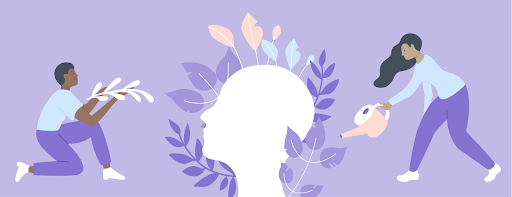
Mental Health: How To Best Support Yourself
Anxiety and depression are among the most common mental health conditions worldwide, with the World Health Organization (WHO) stating that depression could be one of the top health concerns in the world by 2030. As we saw spikes in mental health issues throughout the pandemic, it became even more clear that proper resources and information is needed to help.
General anxiety disorder affects around 6.8 million people in the U.S alone. If you’ve experienced symptoms of anxiety or depression, you should know you are not alone. With varying levels of severity, sometimes making lifestyle changes can be greatly beneficial to your mood and how you feel.
Below we’ll outline a handful of ways to address your mental health and live life as a healthier, happier you.
Diet
Food is what fuels us, and while we all may know that it gives us energy, what we put in our body matters for our mental health too. A study looking at adults over the age of 50 years found a link between higher levels of anxiety and diets high in saturated fat and added sugars. Researchers have noted similar findings in kids and teenagers. For example, a 2019 review of 56 studies found an association between a high intake of healthful foods, such as olive oil, fish, nuts, legumes, dairy products, fruits, and vegetables, and a reduced risk of depression during adolescence.
Curating a diet that gives you brain power, a healthy gut, and long-lasting energy is essential to feeling your best. Taking the lag and fatigue we often feel out of our day is huge in helping to combat mental health issues.
Exercise
Thirty minutes of exercise a day can change your life for the better. It’s important to view exercise not just for a physical need or desire but for a mental one too. Aerobic exercises, including jogging, swimming, cycling, walking, gardening, and dancing, have been proved to reduce anxiety and depression. When you exercise, the blood circulation to your brain increases which is what is believed to help boost your mood. Exercise also improves mental health by reducing anxiety, depression, and negative mood and by improving self-esteem and cognitive function.
Taking your workout outdoors on a sunny day is also beneficial because your body will soak up all the vitamin d that you need.
It isn’t about pushing yourself too hard. It’s simply finding an exercise that you enjoy, even leisurely, and committing to it daily for 30 minutes.
Life Coach
When you’re struggling with your mental health, you may need someone to talk to and help you create a plan. Talking to someone like a life coach can help you identify where stress is stemming from in your life and work with you to create a realistic action plan to move forward.
Too often, people struggle in silence by themselves. While you may not feel comfortable opening up to people in your life, involving an outside and a professionally trained party can help equip you with the tools for success.
Check out these other benefits that a life coach can have on your life.
Medical Guidance
As mentioned earlier, there are varying levels of stress, anxiety, and depression. While lifestyle changes can be a part of the solution, you may need the advice and guidance of a medical professional. In 2019, 19.2% of U.S. adults received any mental health treatment in the past 12 months, including 15.8% who had taken prescription medication for their mental health and 9.5% who had received counseling or therapy from a mental health professional.
At Blue Coral, I work to provide you with the care and resources needed to be the healthiest version of yourself. I never want to see people struggle or feel the sometimes debilitating symptoms that anxiety and depression can create. Get in touch to schedule a consultation and take the first step on your mental health journey.

No Comments